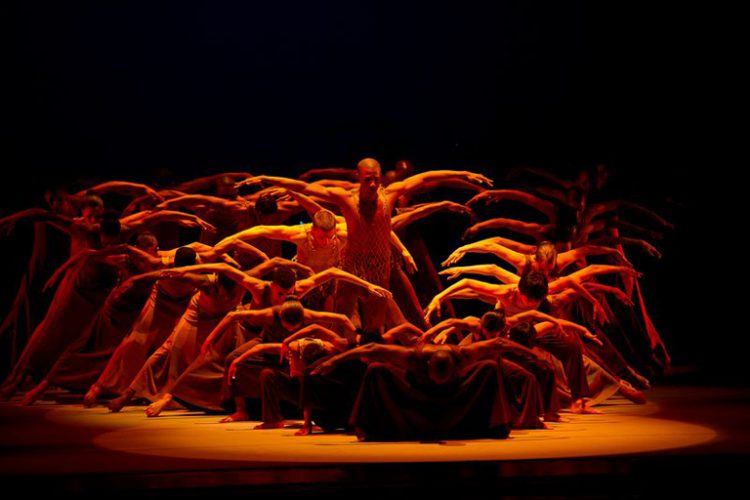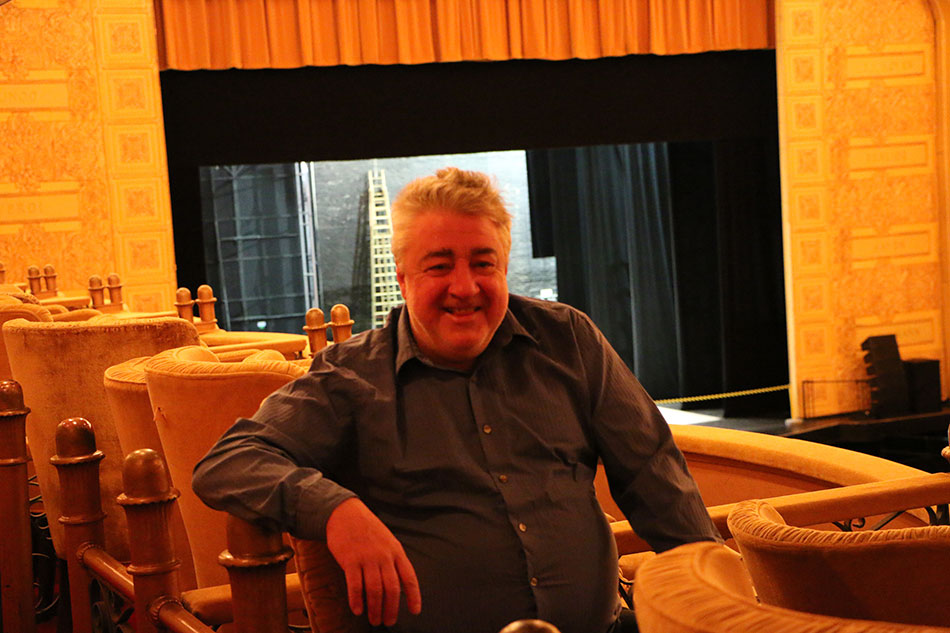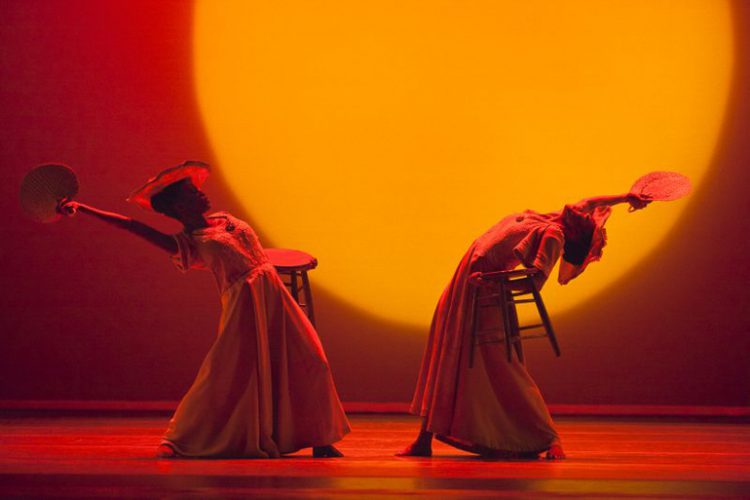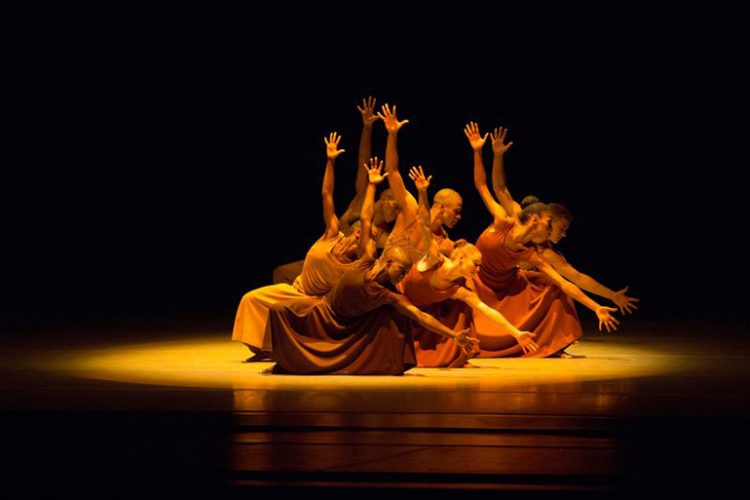Part III: Revelations from the road: touring with Alvin Ailey
For young people just starting out in the industry, figuring out what you’re passionate about and deciding on a career can be quite daunting. And once you get your foot in the door somewhere and gain some experience, it can be difficult to take the next step to move forward on your career path. It can also be challenging to build a career on a touring show without compromising your personal life.
When I was given the opportunity to interview the Alvin Ailey American Dance Theater tech crew in 2013, I was enthralled by Kristin Colvin Young’s story. Her path to becoming the production stage manager for the Alvin Ailey company was anything but predetermined. It included a lot of reflection on what makes her happy, some risk taking, and a great deal of passion. She gave a lot of advice that is invaluable to those making the leap into the entertainment world.
The Alvin Ailey company has a dizzying schedule, touring more than any other dance company, which could complicate relationships and very easily lead to burnout. But Kristin has found a way to balance a career on the road with a home life. Her advice on maintaining that balance is incredibly beneficial to those considering a touring career.
Below you can see what Kristin and I chatted about and read her advice. This is my third blog post detailing my interviews with the tech crew. You can read my interview with E.J. Corrigan, Ailey’s late technical director, here, and my interview with David Kerr, the former head electrician, here.
Me: How long have you been a stage manager for Ailey?
Kristin: I joined AAADT in 2000. This is my 14th season. But I’ve been touring professionally since 1997.
Me: What was your first tour?
Kristin: I was the company manager/assistant stage manager/wardrobe for the Parsons Dance Company, from ’97 until 2000. It was a jack-of-all-trades position. [Artistic Director] David [Parsons] hired me right out of college. I had no idea what it meant to be a touring stagehand, and I learned very, very quickly.
Me: What were your first lessons coming from that kind of environment, not knowing what to expect? What was the transition from your first gig to Ailey like?
Kristin: The biggest shock to me was coming from a company of 10 dancers and two technicians, and translating that to Ailey where we have 16 crew and 30 dancers. My workload was cut tremendously. I had no idea that other people would do all the stuff that I used to do. Not having to do laundry after all the performances. And by laundry, I mean in my bathtub, because the theaters we toured didn’t have washing machines and dryers. To a company that had their own washing machines and dryers in the truck. And then 30 dancers versus 10 dancers. I went from a very familiar setting with the 12 of us being everything to each other, to coming to a company that’s a traveling village of 50, and if you didn’t like somebody, you didn’t have to talk to them, you didn’t have to hang out every night. It was different. The possibilities were endless, just in terms of the breadth of things, and you could learn and grow, but it was kind of a shock. It was like going from a very small, rural community to a really big, cosmopolitan city.
It was the right move, though. The appeal of moving to Ailey – not only being bigger and having a larger touring experience – was that it’s a repertory company. So, even though we have a huge responsibility to honor Mr. Ailey’s works, each season we’d be doing work from various choreographers – from West African to modern to hip hop to ballet – and having been a dancer since a young age and a dance major in college, that was really appealing to me. The ability to be a part of so many choreographers’ worlds was really appealing.
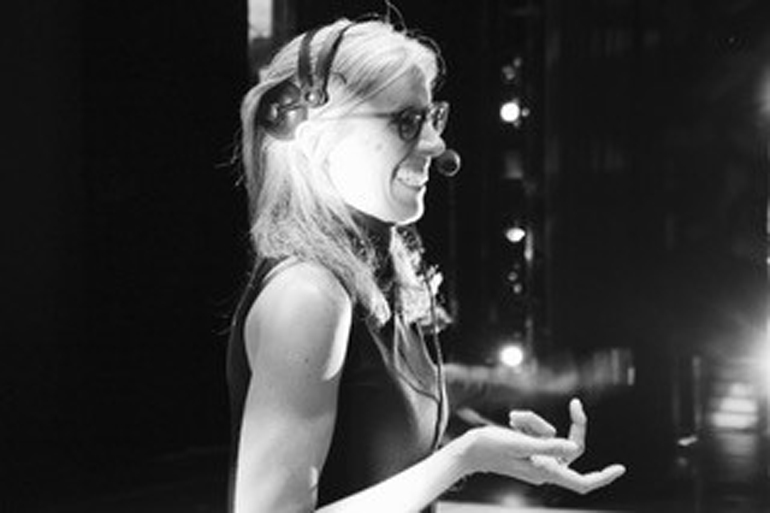
Me: Do you feel like having that dance background gives you a unique perspective on being a stage manager for the company?
Kristin: Definitely. I know firsthand what they go through on stage – in a very rudimentary way. I won’t say that I know what it means to dance four ballets in an evening at this caliber. But I do have a vocabulary that we can share. So, yes, I do think my training is invaluable.
I always encourage. I have a lot of mentees all over the United States. I kind of collect them and try to encourage them. I do some lecturing at different universities and colleges, and I always impress upon them that they should at least take one dance class. They should at least take one acting class. They should at least spend some time on the stage with an audience and the lights shining at them. Not just doing a sound check an hour before the curtain goes up. They need to have that experience to know what the performers they work with are going through, so that you can understand when they run off stage and yell at you that someone’s taking a picture of them or the monitors aren’t loud enough. But you won’t take it personally. You’ll just understand that their adrenaline is going. You need that experience.
I also encourage the dancers to understand what we do. We love it when dancers come and shadow us at load-ins or they take a look at the stage before we even get to put our stuff in. We actually have a dancer right now who’s working toward her transition. She wants to be a stage manager and she’s spent the last two years shadowing me. She’s given her notice and she will leave the company as a dancer at the end of May. Then she’s hopefully going to work for another company.
Me: Did she come to you?
Kristin: She did. From the moment she got hired, she said, “You know, I love dancing, this is my career right now, but I know that I want to move on and do what you do.”
Me: What do you think is different about being a stage manager for this company than another company? Is there a different feeling here? A different vibe?
Kristin: I have a lot of stage manager friends who work for the different ballet companies and I think we’re all at the core of the same thing. We’re actually all pretty much the same person, when it comes to that. Having lunch with them recently, we all love our jobs, we love what’s happening on stage and what’s happening off stage. Being a stage manager, you’re an artist, but you’re also an organization freak. There’s a part of us that loves the paperwork. There’s a part of us that loves doing all the minutiae of getting to where the production is. But then you have the amazing ability to be an artist for 90 to 140 minutes every night. There are many ballets that I consider myself one of the performers. There’s a cohesion between what’s on stage and what I’m calling and what’s being made to happen and the choices I make. I think no matter, at the core, in the union companies there are base things you have to do. But the stage manager at the Joffrey, she’s an AGMA [American Guild of Musical Artists] stage manager and I’m an AGMA stage manager. Our jobs are completely different except for what happens when we’re calling shows. They have a scheduler, they have somebody who deals with checking in rehearsals and stuff. We don’t have that. So I have a whole set of duties that she doesn’t have, and same with her. There are differences like that between the companies, but I think in regard to your passion and the enjoyment you get out of what you do, we’re all pretty much the same. You wouldn’t do it if you didn’t love it.
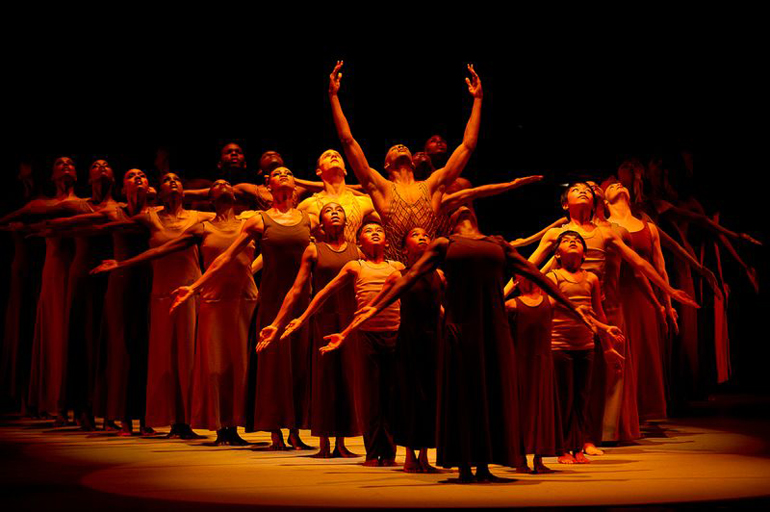
Me: How’d you catch the bug?
Kristin: For touring and being a stage manager?
Me: For all of it. For getting into the business.
KCY: Like I said, I started dancing at a young age. I was a modern dancer. I hated ballet. I didn’t like all that ‘attached-to-the-barre’ sort of thing. I wanted to roll around and flip people and do weird things. I danced all the way through college. Actually when I was in high school, I started stage managing for musicals. I know my singing ability and I know that I’m not meant to be on that stage to sing. It’s just not my calling. So, I went backstage and I loved that. But I didn’t know it was more than just high school musicals. I went to college and was a dance major. I went to Mount Holyoke, which is part of the Five College program, which is great because the dance department isn’t just Mount Holyoke, it’s all five colleges. So there’s so much opportunity to dance, but there’s also so much opportunity to be a stage manager. And I stage managed one show and got rave reviews, and so if I wasn’t cast in a performance, more often than not, the choreographer or the faculty member would say, “Oh, could you stage manage this for us?” It turned out more and more and more I was stage managing rather than dancing, which turned out to be fine. At that point, I really had no hopes of doing anything in that world. I didn’t know that that was a possibility. I was a double major, so I thought I was going to be a social worker.
Me: And you are a social worker anyway.
Kristin: Yeah! I had a concentration in dance therapy and I thought I’d go off and be some crunchy, New England dance therapist. When it came time to graduate, all my girlfriends were going on to either some sort of set job or continuing their education, and I had nothing. I didn’t know what I wanted to do. I saw a flier for Jacob’s Pillow, the international dance festival. I called them because I realized I had missed the deadline for interns, and sure enough, two days before, somebody had dropped out of the intern program. So they took me, just because they needed to fill the spot. Since then, my journey has been blessed. It was the 65th anniversary at the Pillow, so all of the major dance companies were there. I was chosen to stage manage the gala. That night I met David Parsons. And from that moment on, it just kept growing. I worked with Bill T. Jones, Merce Cunningham, Meredith Monk. The whole summer was an amazing season. And halfway through the season, David posted that they were looking for a company manager/assistant stage manager [ASM]/wardrobe and I honestly applied to give my résumé a workout. I padded it with anything and everything. I had a really good interview and then they hired me. I toured the world for three years with them and learned anything and everything I could.
My connection to Ailey was when I met Al Crawford [lighting designer for Alvin Ailey]. We were in Atlanta. Parsons was supposed to open the same night as Ailey and we had to cancel, because Ailey had taken the entire city’s dance audience. The performance center called me and said, “We’re going to move your performance to tomorrow night.” Being the bold, young woman that I was, I called the then-company manager of Ailey and said, “You know, we’re out of work for the night. Do you think we could come see your show?” And he said, “Sure! There’s only 12 of you.” So we went.
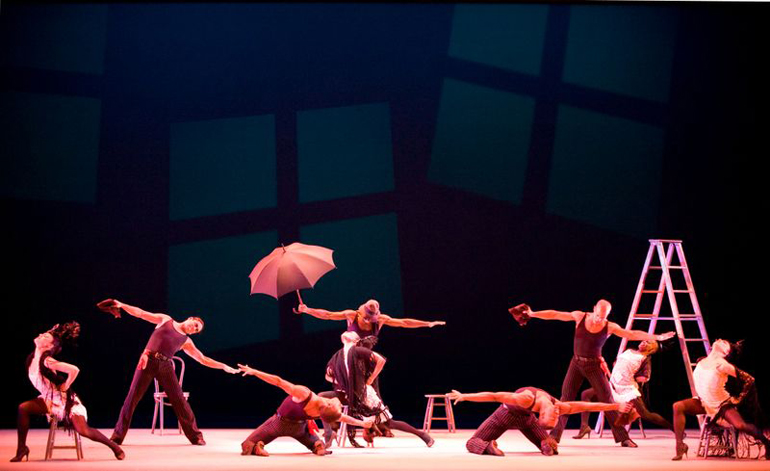
photo by Nan Melville
There’s a cross-pollination of dancers in this world; many of them went to Juilliard, the Ailey School or UNCSA [University of North Carolina School of the Arts], so a lot of the dancers in Parsons knew a lot of the dancers in Ailey. But before we went into the house, Chris Kurtz, who was board op for Bill T. when I was at the Pillow, was the board op for Ailey. I bumped into him and he was like, “Oh my god! What are you doing here?” I explained and he was like “No. Unh-uh. You’re a company manager? That is not correct.” And he whispered in my ear that I needed to go to the party afterwards and meet their crew and then told me, “Our SM is leaving to have a baby and our ASM is stepping up and they are just about to post that they need an ASM.”
With that knowledge, I went and I met Al and Alaric [Einar Hahn, theater manager/director of rentals] and more crew, and I was just so enamored with them. I went back to the hotel and fixed my résumé, which I hadn’t touched since I joined Parsons. I believe I faxed it. It was that long ago. And once I had sent it, I went to David and told him what I had done. We had a heart to heart, and he understood. He was like ‘You’re a stage manager and you have a great career ahead of you, and I won’t begrudge you if it happens.’ Sure enough, I got an interview and I went down to D.C. when they were on tour and met them again. A month later, they called me and said, “Come on. Let’s do this.” And I said, “Okay.”
Me: Was it exciting?
Kristin: Yeah, it was unbelievable.
Me: What were you feeling?
Kristin: I was elated! It was great!
Me: Were you nervous?
Kristin: Of course I was nervous. I came in as the ASM at the time, and the stage manager and I became fast friends. Some of the dancers from that era still refer to us as ‘the dream team.’ We could read each other’s minds; we had a good rapport. His quirkiness was balanced by mine and vice versa. He was much more loosey-goosey, go with the flow, and I’m much more wound tight, so it was a nice balance.
Now that I’ve been the head for the last seven, going on eight, years, I’ve found that I’ve shifted and my assistants have been a good balance for me. It’s been a growth process the entire time. Luckily, I’ve had people grow with me. Al, Joe – our master carpenter – and I are all the same age and we all came into the company within three years of each other. I feel like we’ve all become who we are together and have had some impact on that professionally. It’s really special. A lot of dance companies that I come into contact with are amazed that so many of us on the crew have lasted so long.
Me: What do you think accounts for that? Why do you think there is that longevity?
Kristin: It’s a great company and it’s never a dull moment. It’s not just ballet. It’s not just modern. It’s not just hip hop. It’s every single genre, all the time. And because we are the most-toured company, we are always six to 12 months ahead of ourselves. So right now, we’re in 2014 domestic tour; we are always looking toward the summer international tour. We are starting to look at 2015’s tours and we’re looking at 2016 and 2017.
Me: That’s a lot of stuff going on.
Kristin: It’s a lot of stuff, but I think that’s also something that keeps us going. You don’t have much time to relax, but it doesn’t mean that we don’t have rich social lives; it doesn’t mean that we don’t have children and families and the whole package. You can make it work and several of us have, and we continue to thrive in that. But I think we’re all a special combination of people that can’t just be happy just doing one thing. We’re always going to have something pumping us to do more, to be more, and to elevate ourselves as people.
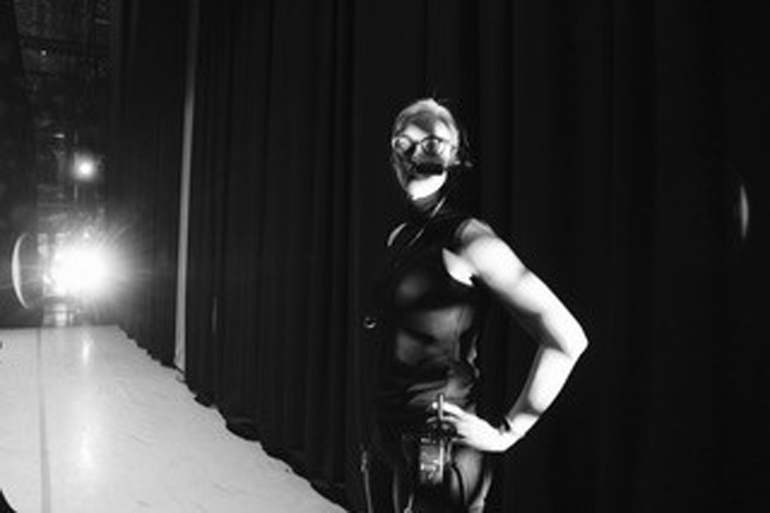
Me: Do you have any outside activities, hobbies? What do you do in the tiny little bit of spare time that you have?
Kristin: Sleep? I’ll take on a couple outside projects. There are some things that Al’s worked on that I’ve also worked on. Our artistic director, Robert Battle, had his own company called Battleworks for several years, and I’m actually one of the founding members of that company. That was a big part of my life, being on the board.
I decorate cakes as a hobby.
Al Crawford: She’s very good.
Me: For friends’ weddings, or…?
Kristin: Yeah. A couple of our dancers, Kirven and Antonio Douthit-Boyd, got married this summer and I made them a four-tiered wedding cake for their wedding. I do specialty cakes, I do characters and things like that, so I’m always working on that skill. It’s possibly a second career down the line. I read, I relax, I do what normal people do, but I also have side projects of my own and things like that.
Me: Do you still dance?
Kristin: No, no, no.
Me: No? Really?
Kristin: When I first joined the company, I’d take class once in a while outside. But no, I don’t do it anymore. I know my limitations. I’m much older now and it’s a lot harder. But I take Zumba and I do things to stay in shape. I miss it. I do. There are some ballets that when we perform them my heart just breaks a little bit, because I wish that I was doing what they’re doing. But that’s good. That’s what keeps you connected. That’s what reminds you why you do it and the love you have. And that translates to the work that you do. If I wasn’t invested and if I wasn’t charmed and falling in love constantly with what I saw on stage, then I wouldn’t do my job as well as I do it. It’s important to have that love affair and to remind yourself why you started this whole process.
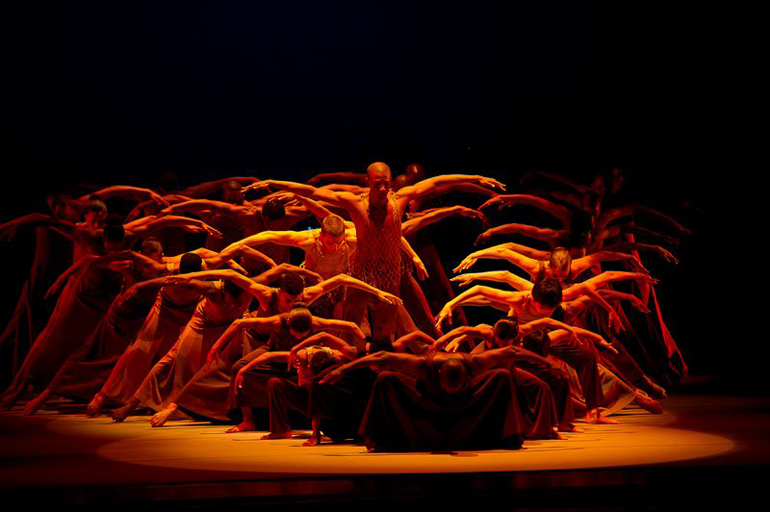
Me: Any tips or advice for people looking to get into touring and keeping that work/life balance?
Kristin: Be honest with yourself. Be honest with your limitations. Be honest with your hopes and dreams and desires. You should never fool yourself or force yourself into something that you don’t want to do. If something isn’t right for you, make a change. Sometimes that means making the hard decision to leave touring, or sometimes making the courageous decision to talk to the people above you and say, “I love this, but I also love something else, and how do we make it work?” Anything is possible, but you have to be realistic. I think some people forget that.
My assistant just had a baby. A lot of people would have just packed it in and said, “Okay, I’m done,” but she came to me and said that she doesn’t want to stop touring. “I want to keep touring. This is who I am professionally. Yes, I’m also a wife and a mother, but I really want to do both.” And we’ve made it work. But she was honest with me. She shared with me and our superiors that she was dedicated to making this work. In return, I’m dedicated to allowing the flexibility needed to help her balance work and home life. And in turn, just because I’m not a mother doesn’t mean that I’m not allowed flexibility to balance my life. I think that you have to be honest with yourself and honest with the people you work with. And know that if you do that, you can probably make anything happen. People look at a touring mother or a touring father and think, ‘Oh, there’s no way they can make that work.’ But we’ve had dancers with kids, Joe, our master carpenter, has kids, and Nicole, our ASM, has kids. You make it work.
Same thing with relationships. If you find the right person who’s willing to see you only now and again, and is willing to fly out to meet you or wait for you to meet them, you can make it work. It’s all about the right person.
I try and bring that to my experience. You don’t just have to settle. You can make it work. And I think for the most part that those of us who have stayed this long, we’ve found that ability.


